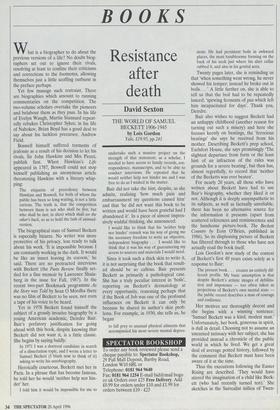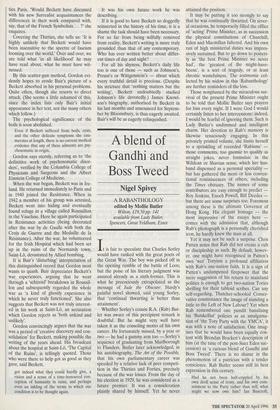BOOKS
Resistance after death
David Sexton
THE WORLD OF SAMUEL BECKETT 1906-1945 by Lois Gordon Yale, £19.95, pp.241 What is a biographer to do about the previous versions of a life? No doubt biog- raphers set out to ignore their rivals, resolving at least to confine their criticisms and corrections to the footnotes, allowing themselves just a little scoffing outburst in the preface perhaps.
Yet few manage such restraint. There are biographies which amount to running commentaries on the competition. The two-volume scholars overtake the pioneers and belabour them as they pass. In his life of Evelyn Waugh, Martin Stannard repeat- edly rebukes Christopher Sykes; in his life of Nabokov, Brian Boyd has a good deal to say about his luckless precursor, Andrew Field.
Boswell himself suffered torments of jealousy as a result of his decision to let his rivals, Sir John Hawkins and Mrs Piozzi, publish first. When Hawkins's Life appeared in 1787, Boswell could not stop himself publishing an anonymous article threatening Hawkins with a literary whip- ping: The etiquette of precedency between Hawkins and Boswell, for both of whom the public has been so long waiting, is not a little curious. The truth is, that the competition between them is not who shall be first, but who shall be last; in short which shall see the other's back, so as to hold the lash of animad- version.
The biographical state of Samuel Beckett is especially bizarre. No writer was more protective of his privacy, less ready to talk about his work. 'It is impossible because I am constantly working in the dark. It would be like an insect leaving its cocoon,' he said. There are no protracted interviews with Beckett (the Paris Review finally set- tled for a fine memoir by Lawrence Shain- berg in the issue for Fall, 1987). In the recent two-part Bookmark programme As the Story was Told by Sean 0 Merdha there was no film of Beckett to be seen, nor even a tape of his voice to be heard.
Yet in 1978 Beckett found himself the subject of a grossly invasive biography by a young American academic, Deirdre Bair. Bair's prefatory justification for going ahead with this book, despite knowing that Beckett did not want it, is a little classic. She begins by saying baldly:
In 1971 I was a doctoral candidate in search of a dissertation topic, and I wrote a letter to Samuel Beckett (I blush now to think of it) asking to write his autobiography.
Heroically courteous, Beckett met her in Paris. In a phrase that has become famous, he told her he would 'neither help nor hin- der' her.
I told him it would be impossible for me to undertake such a massive project on the strength of that statement; as a scholar, I needed to have access to family records, cor- respondence, manuscripts, and to be able to conduct interviews. He repeated that he would neither help nor hinder me and I was free to do as I wished in the matter.
Bair did not take the hint, despite, as she admits, realising 'how much pain and embarrassment my questions caused him' and that 'he did not want this book to be written and would have been grateful had I abandoned it'. In a piece of almost impres- sively wishful thinking, she announced:
I would like to think that his 'neither help nor hinder' remark was his way of giving me the necessary freedom to write an objective, independent biography . . . I would like to think that it was his way of guaranteeing my access to sources and materials I would need.
Since it took such a thick skin to write it, it is not surprising that the book that result- ed should be so callous. Bair presents Beckett as primarily a pathological case. She has a truly peculiar interest in 'boils', reporting on Beckett's dermatology at every opportunity, reasoning perhaps that if the Book of Job was one of the profound influences on Beckett it can only be because he shared its author's skin prob- lems. For example, in 1930, she tells us, he began
to fall prey to unusual physical ailments that accompanied his most severe mental depres- sions. He had persistent boils in awkward places, the most troublesome forming on the back of his neck just where his shirt collar rubbed it, and also in his genital area.
Twenty pages later, she is reminding us that 'when something went wrong, he never showed his temper; instead he broke out in boils. . . ' A little further on, she is able to tell us that the boil had to be repeatedly lanced; 'spewing ferments of pus which left him incapacitated for days'. Thank you, Deirdre.
Bair also wishes to suggest Beckett had an unhappy childhood (another reason for turning out such a misery) and here she focuses keenly on beatings, the 'ferocious beatings' she says he received from his mother. Describing Beckett's prep school, Earlsfort House, she says promisingly 'The slightest departure from form or the least hint of an infraction of the rules was grounds for a severe beating', but then has, almost regretfully, to record that 'neither of the Becketts was ever beaten'.
For nearly 20 years, all those who have written about Beckett have had to use Bair's biography, whether they liked it or not. Although it is deeply unsympathetic to its subjects, as well as factually unreliable, there has been no alternative source for the information it presents (apart from scattered references and reminiscences and the handsome picture-book, The Beckett Country by Eoin O'Brien, published in 1986). So its displeasing picture of Beckett has filtered through to those who have not actually read the book itself.
Lois Gordon's new study of the context of Beckett's first 40 years exists solely as a response to Bair:
The present book . .. creates an entirely dif- ferent profile. My basic assumption is that despite Beckett's artistic images of debilita- tion and impotence — too often taken as projections of Beckett's own mental state the public record describes a man of courage and resilience.
Her motives are thoroughly decent and she begins with a winning sentence: `Samuel Beckett was a kind, modest man.' Unfortunately, her book, generous in spirit, is dull in detail. Choosing not to assume an unearned intimacy with her subject, she has provided instead a chronicle of the public world in which he lived. We get a great deal of average potted history, followed by the comment that Beckett must have been aware of it at the time.
Thus the executions following the Easter Rising are described. 'They would have stirred the imagination of a child like Beck- ett (who had recently turned ten).' She sketches in the Surrealist milieu of Twen- ties Paris. 'Would Beckett have discussed with his new Surrealist acquaintances the differences in their work compared with, say, that of the French Symbolists. . . ?' she enquires.
Covering the Thirties, she tells us: 'It is highly unlikely that Beckett would have been insensitive to the spectre of fascism looming over the world.' Over and over, we are told what 'in all likelihood' he may have read about, what he must have wit- nessed.
By this scatter-gun method, Gordon evi- dently hopes to erode Bair's picture of a Beckett absorbed in his personal problems. Quite often, though she resorts to direct attack. (She seems a little ashamed of this, since the index lists only Bair's initial appearance in her text, not the many others which follow.) The psychological significance of the boils is soon abolished.
Even if Beckett suffered from boils, cysts, and the other delicate symptoms she enu- merates at length, there is no current medical evidence that any of these ailments are psy- chosomatic in origin,
Gordon says sternly, referring us to 'the definitive work of psychosomatic disor- ders', verified by the Columbia College of Physicians and Surgeons and the Albert Einstein College of Medicine.
When the war began, Beckett was in Ire- land. He returned immediately to Paris and in 1940 joined the Resistance. When in 1942 a member of his group was arrested, Beckett went into hiding and eventually found refuge in a village called Roussillon in the Vaucluse. Here he again participated in Resistance activities (being decorated after the war by de Gaulle with both the Croix de Guerre and the Medaille de la Resistance). After the war, he volunteered for the Irish Hospital which had been set up in the ruins of the Normandy town, Saint-I1), devastated by Allied bombing.
It is Bair's 'disturbing' interpretation of this distinguished record that Gordon most wants to quash. Bair depreciates Beckett's war experiences, arguing that he went through a 'schizoid' breakdown in Roussil- lon and subsequently regarded the whole war as 'a kind of ghostly experience in which he never truly functioned'. She also suggests that Beckett was not truly interest- ed in his work at Saint-L6, an accusation which Gordon rejects as 'both unkind and unlikely'.
Gordon convincingly argues that the war was a period of 'creative discovery and con- solidation' for Beckett, making possible the writing of the years ahead. His broadcast about the hospital at Saint-L8, 'The Capital of the Ruins', is tellingly quoted. Those who were there to help got as good as they gave, said Beckett,
got indeed what they could hardly give, a vision and a sense of a time-honoured con- ception of humanity in ruins, and perhaps even an inkling of the terms in which our condition is to be thought again.
It was his own future work he was describing.
If it is good to have Beckett so doggedly reinserted in the history of his time, it is a shame the task should have been necessary. For so far from being wilfully removed from reality, Beckett's writing is more truly grounded than that of any contemporary. Who has ever written better about differ- ent times of day and night?
For all his shyness, Beckett's daily life too is one of those — such as Johnson's, Proust's or Wittgenstein's — about which every truthful detail is precious. (Despite his stricture that 'nothing matters but the writing', Beckett undoubtedly studied Johnson's life devotedly.) James Knowl- son's biography, authorised by Beckett in his last months and announced for Septem- ber by Bloomsbury, is thus eagerly awaited. Bair's will be as eagerly relinquished.



































































 Previous page
Previous page